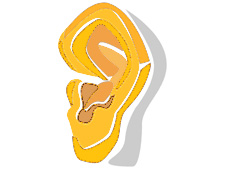It’s the time of year for saving money!
My recent column examining the work of the late Harry Pearson, founder of the Absolute Sound, sparked discussion here and on Facebook. That’s what I hoped for; I didn’t have much of an axe to grind on that one. But one of the responses to that column — combined with my reading of old issues of TAS to prepare for that column, plus a recent comment a manufacturer made about me — reminded me that when it comes to audio, I do have a few axes to grind.
 One is the idea of a “golden ear,” defined on Wikipedia as “a term in audio circles referring to a person who is thought to possess special talents in hearing.” This idea was reflected in the comments of a reader who claimed that Pearson “saw sound in colors,” as if he had some power the rest of us don’t possess. Pearson sometimes used the term “golden ear” to refer to himself or his colleagues; in fact, he did so in the very first issue of TAS. The manufacturer I mentioned used it, in a flattering way, to introduce me to a group of engineers.
One is the idea of a “golden ear,” defined on Wikipedia as “a term in audio circles referring to a person who is thought to possess special talents in hearing.” This idea was reflected in the comments of a reader who claimed that Pearson “saw sound in colors,” as if he had some power the rest of us don’t possess. Pearson sometimes used the term “golden ear” to refer to himself or his colleagues; in fact, he did so in the very first issue of TAS. The manufacturer I mentioned used it, in a flattering way, to introduce me to a group of engineers.
Although I must point out that the speaker company that goes by the name GoldenEar makes some truly extraordinary products, I always cringe a little when I see the term “golden ear” applied to reviewers, because it lends an air of mystique to a task that should involve no mystique: that of evaluating audio components.
Since I got into this biz in 1989, I have worked and associated with numerous audio reviewers. Many have participated in the dozens of listening tests I’ve conducted as an editor for Video, Home Theater, Home Entertainment, Sound & Vision and the Wirecutter. At trade shows and press events, I’ve been in listening sessions with most of the audio writers now working in the U.S., and I’ve heard and read their comments.
I’m here to tell you, there is nothing special about reviewers’ aural perception. While their opinion of certain products varies from mine, their comments never revealed anything I didn’t hear. And they’ve sometimes overlooked major tonal colorations and distortions, especially in speakers.
In the listening panels I’ve conducted, what for me defines a good listener is NOT one who has particular tastes, or owns particular brands, or who is especially erudite in his/her descriptions, or who slings around audiophile jargon like “inner detail” and “macrodynamics.” For me, the most useful listeners are the ones one can identify and accurately describe specific colorations in a product’s sound. This requires not a “golden ear,” but the willingness to participate in a lot of listening tests and to develop an in-depth knowledge of audio.
While experience in hearing audio products is always edifying, most of the gains I’ve made in my listening skills have been through hands-on efforts to increase my knowledge of audio — for example, through reading the Loudspeaker Design Cookbook, through recording and mixing music, and through measuring and building speakers. It’s much like my experience in jazz: I’ve learned more about jazz from trying to play it myself than I have from listening to my favorite players and reading music reviews.
For example, the manufacturer cited above called me a “golden ear” because I was able to guess that the crossover point between the drivers in one of his Bluetooth speakers was 800 Hz. I can pull off this “trick” often, but it’s not because my hearing is any better than yours, or because I have some sort of special perception. It’s because almost 20 years ago, I read the Loudspeaker Design Cookbook and began doing speaker measurements. These activities taught me the reasons I was hearing what I was hearing. It’s all due to experience, not to some innate talent — and it’s the same reason someone like Ron Carter can rip through Duke Ellington’s “Cotton Tail” at 250 beats per minute while I struggle to play it at half that speed.
If you want to build your listening skills, there’s a much more effective way than doing what I did. Just download the How to Listen training program that Harman International (parent company of JBL, Revel, Infinity, Mark Levinson and Harman Kardon) developed to train listeners for its own product testing. Work your way through that, then read the Loudspeaker Design Cookbook. Your listening skills and technical knowledge of speakers will then be better than those of all but perhaps half a dozen reviewers in the world.
Besides, even if someone did have some sort of extraordinary hearing abilities, how would that be relevant to the average listener? Imagine if a TV reviewer could see light in the ultraviolet or infrared bands. Would their opinions be more useful to you? Or less?
The bottom line is, when it comes to hearing, no one has a “golden ear.” Good listeners are made, not born.





